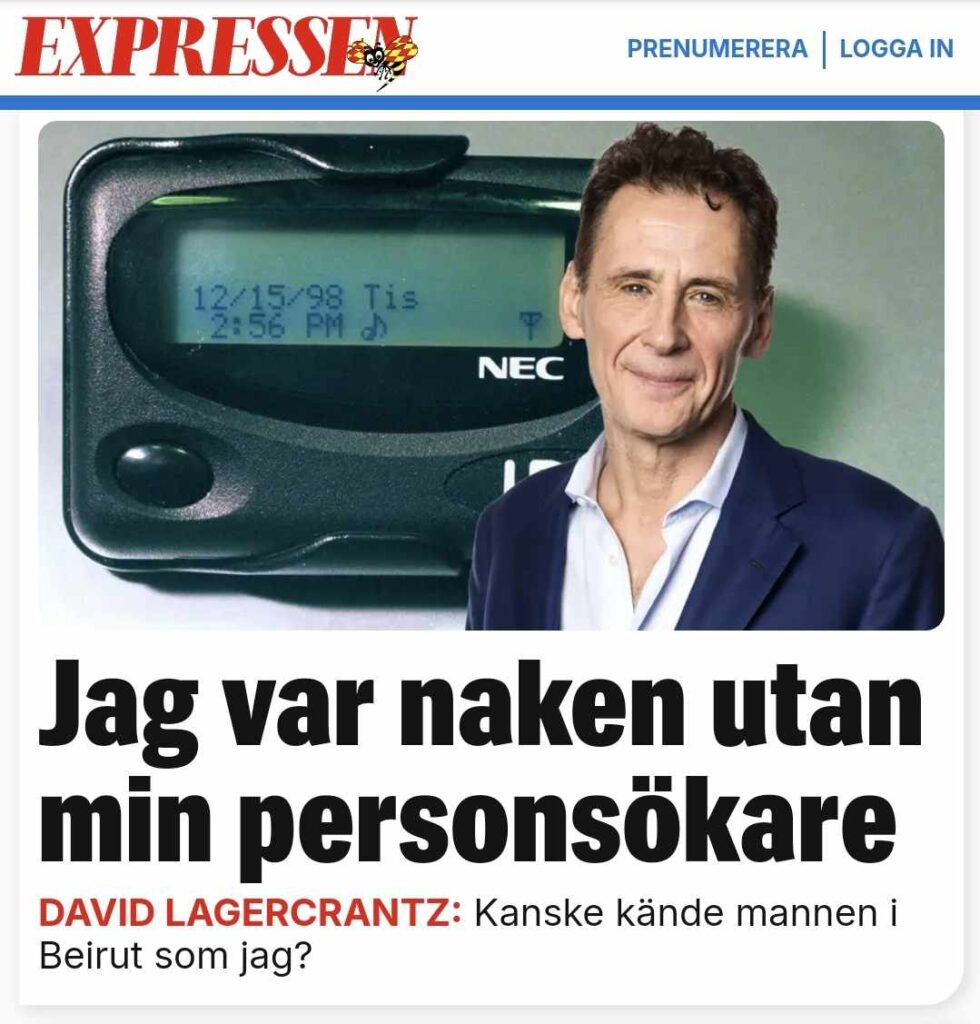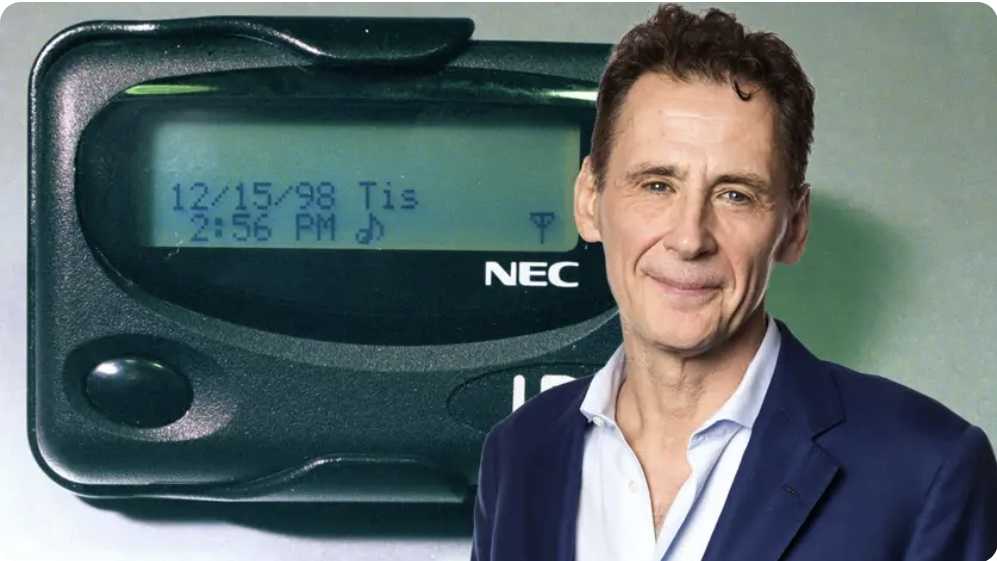The Israeli intelligence service Mossad carried out, most likely, one of the most successful attacks in world history during the past week. By detonating thousands of pagers and walkie-talkies, pre-prepared with explosives, it was possible to knock out thousands of members and leaders of the Lebanon-based terrorist group Hezbollah.
If Hezbollah’s own intelligence documents are correct, 879 terrorists and 291 “senior commanders” have had to cash in their 72 virgins and several thousand are said to have been seriously injured.
The consequence is that they cannot plan and carry out their goals here on earth, that is to kill Jews and eradicate the state of Israel. In addition, they also want to take the opportunity to get rid of homosexuals and non-Muslims.
One could therefore believe that a decimation of the number of racist and homophobic terrorists would be regarded as something positive by the champions of democracy, diversity and human rights that Swedish journalists usually present themselves as. But no. Since Tuesday, the Swedish media has been flooded with indignation and horror.
“Maybe the man in Beirut felt like me?”
But the award goes to David Lagercrantz, who in a column published in Sunday’s Expressen spends 2,609 characters (without spaces) identifying himself with terrorists. Or with “the man in Beirut”, as he puts it.

Illustration: Screenshot Expressen on 22 September.
“Maybe the man in Beirut felt like me?” David Lagercrantz asks, and exemplifies by telling us about his own relationship with his pager in the early 90s:
“It happened that I had dinner with a new date, and toasted expectantly. Then the pager beeped, and I flinched and always said the same thing: I have to take this,” writes Lagercrantz and continues:
“Then I borrowed a phone and called my managers who told me what had happened. Often it was a murder, a disaster of some kind. I worked as a crime reporter, and if I was really on a date, I remember one in Jönköping in particular, I looked at the girl and thought: never in my life will I leave her, I will not ruin this. I always answered: I’m going, I’ve got my bag packed.
My work code, somewhat ridiculously loyal, was to be dispatched without exception, and even if it ruined my privacy, it flattered me that I was needed and trusted, and I was proud of my pager.”
So David Lagercrantz draws parallels between his own high work ethic and the drive of the Hezbollah terrorists whose goal is to exterminate both the state of Israel and every living Jew? In that case, let’s rewrite parts of the text to make it clearer:
“Then I borrowed a phone and called my leaders who told me what was going to happen. Often it was a murder, an assassination attempt of some kind. I was hired as a terrorist, and if I was really on a date, I remember one in Jouaiya in particular, I looked at the girl and thought: never in my life will I leave her, I will not ruin this. I always answered: I’m going, I’ve got my bag packed.
My work code, somewhat ridiculously loyal, was to be dispatched without exception, and even if it ruined my privacy, it flattered me that I was needed and trusted, and I was proud of my pager.”
Only a few words have been replaced, but the difference between having an “always ready code” as a crime reporter and as a terrorist can still be considered relatively noticeable: one reports on murders and disasters that have occurred, the other murders and ensures so that disasters happen.
Remarkable – or just revealing?
Nevertheless, Expressen’s columnist identifies with the thousands of Hezbollah terrorists who on Tuesday and Wednesday had to bear the consequences of their murderous ideology. It is, to put it diplomatically, remarkable. Or not.
Perhaps what Lagercrantz writes is not at all remarkable, but merely revealing? Revealing how he, his colleagues at Expressen and the majority of other values-based certified journalists and writers in newsrooms around Sweden actually think? That the exploding pagers affected completely normal individuals? Randomly selected, a Lebanese “John Doe”? People like themselves? Lagercrantz clarifies his concern:
“The threat can be in what we have closest to the body, and I understand that the fear is spreading in Lebanon. […] what’s next? The cell phones, the watches, the electric toothbrushes, like in my nightmareish thoughts this morning?
A new reality is emerging, a world where our own technology is turned against us, the technology we’ve come to merge with, and which we hope will bring us good news and make us feel needed.”
This is Lagercrantz’ conclusion: Perhaps “the man in Beirut” just wanted to feel “needed”, to get a chance “to excel”, as David Lagercrantz himself claims to have done, during his time as a crime reporter? The difference between carrying out and monitoring murder and terror is perhaps only marginal, and it is perhaps the feeling of being needed that is central? Yes, that’s it! At least in the head of a prized Expressen columnist.
In any case, Lagercrantz now says he worries that his own electric toothbrush could explode in his bathroom. The risk of that happening is estimated as slim to none – unless Lagercrantz is found on Mossad’s shit list, of course.
Lagercrantz’s column is an all time low
In the video presentation that can be found below the text, Lagercrantz says he wants to “educate people and spark debate”. That might very well be the case. But the question is whether people who identify with Hezbollah terrorists should be given responsibility for public education?
Lagercrantz probably regards Sunday’s creations as proof of his high intellectual capacity: he is so eminent that he can even see the good and the human in terrorists.
And precisely that ability seems to be something very highly priced among Swedish journalists, columnists and editorial writers. How did Anders Lindberg at the competing newspaper Aftonbladet express himself? “Even terrorists are actually human beings” (”Även terrorister är faktiskt människor”).
Lindberg’s record for moral nadir stood for almost a decade, but now we have reached an all time low: “Maybe the man in Beirut felt like me?” David Lagercrantz asks when he picks up the baton after Lindberg, and Expressen finds it unproblematic to publish the question.
Well, maybe “the man” – or more correctly – “the terrorist in Beirut” did. Perhaps the terrorist felt that by planning and carrying out murders, kidnappings, rapes and other terror directed at civilian Jewish men, women and children, he was “needed” and “allowed to excel”? It is possible. But in that case, the terrorist in Beirut is a deeply disturbed individual, driven by a sick and perverted ideology that must be condemned. Not relativized.
Who does the Swedish media identify with?
But Lagercrantz does just that. By identifying himself with “the man in Beirut”, he relativizes the terrorist and thus also terrorism. The anti-Semitic terrorism that caused the October 7 massacre, that causes daily attacks on Jews worldwide, and that has left some 60 abductees – including toddlers like brothers Ariel and Kfir Bibas – still being held hostage in the tunnels under Gaza.
“Maybe the man in Beirut felt like me?” asks David Lagercrantz. The question says a lot about the columnist, but also about the Swedish media. What is really worrying is the follow-up question that arises: Maybe the Swedish media feel like the terrorists in Beirut?
After last week’s media reactions, we understand that the answer to that question is unfortunately not a resounding “no, absolutely not”.
Perhaps David Lagercrantz didn’t have the judgment to realize the complete absurdity of his column, but someone at the Expressen should have put a stop to it. But no one acted. This means that today it is unproblematic to identify with terrorists and relativize both their driving forces and their actions. They are, just like you and me, simply loyal individuals who want to feel needed. At least in the eyes of the media.
And that should worry us all far more than if our electric toothbrush is going to explode tonight.

